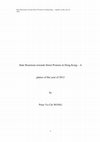Papers by Peter Yu-chi Wong

The authority of the network monarchy has been declining in Thailand since 1992. Despite a bloomi... more The authority of the network monarchy has been declining in Thailand since 1992. Despite a blooming literature on the Thai monarchy, no systematic study has emerged to explain the phenomenon. By process tracing, this dissertation aims to fill the gap by arguing that the declining monarchical authority in Thailand has undergone a three-stage development since 1992. The decline of the monarchical authority is treated as a historical process that ordinary Thais have been mobilised to challenge the despotic order. Both effects of historical developments and socio-economic changes of each stage contribute to the appearances of oppositions in the society to the monarchy. Therefore, the emergence of the 1997 constitution, rise of Thaksin Shinawatra and the Red-shirt Movements are perceived as the key for understanding the phenomenon. Thus, in this sense, with the fall of the monarchical authority in Thailand, the Thai democratisation has been advanced that Thais have had a wider political space for pursuing democracy.
Essay Question: "Democratization in Southeast Asia has encountered -and arguably at times engende... more Essay Question: "Democratization in Southeast Asia has encountered -and arguably at times engendered -various forms of violence". Discuss with reference to one or more countries covered in the course.
Formative Essay Topic: How should we understand the role of the monarchy in terms of democratizat... more Formative Essay Topic: How should we understand the role of the monarchy in terms of democratization in Thailand? LSE Student ID: 201409095 (Peter Yu Chi WONG) Word Count: 1,988

Hong Kong is a city of protest (Ng 2008).By empirical data, this paper suggests the state tended ... more Hong Kong is a city of protest (Ng 2008).By empirical data, this paper suggests the state tended to ignore most street protests occurred in 2012 in Hong Kong, making the majority of these demonstrations ‘fruitless’ in outcomes. While in some rare cases, the state did respond positively to protesters. With inabilities of existing literatures as well as protest nature and participant number of protests in explaining such patterns, this paper turns to a political regime approach as an alternative, arguing liberal authoritarianism operating in Hong Kong is the main reason for both low state responses and its responsiveness, and, to certain cases, positive reactions. Elements of liberal authoritarianism like absence of electoral competitiveness, a politics/administration dichotomy and a political culture created by existence of civil liberties in Hong Kong help to explain the complicated phenomenon. By doing so, the research aims to contribute to studies of governmental responses to protests with a different and new light.
Hong Kong is a society of widening income inequality. Investigating the applicability of three so... more Hong Kong is a society of widening income inequality. Investigating the applicability of three sociological paradigms to income inequality in Hong Kong, the paper finds Marxism and conflict theories as the most relevant perspective in order to understand the issue, arguing exploitation, role of state as a reflection of capitalist class, and prevalence of free market in the territory are the culprits of the worrying social problem in the city. To alleviate the problem, the essay calls the government to abandon its long-hailed 'Positive Non-interventionism' for a more interventionist approach. Therefore welfare programmes could serve to mediate the social illness.
We would like to adopt a multiple methods to conduct the research. Both qualitative approach and ... more We would like to adopt a multiple methods to conduct the research. Both qualitative approach and quantitative approach are used in the study. We would like to use in-depth analysis of small number of cases to generate a case study as well as to use

Uploads
Papers by Peter Yu-chi Wong